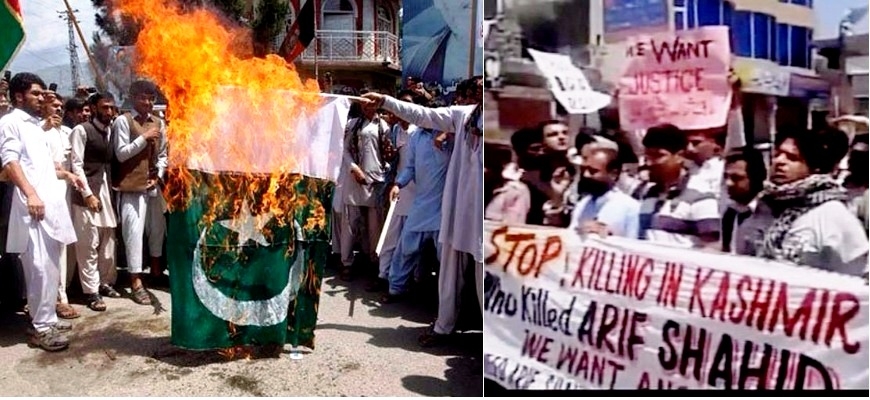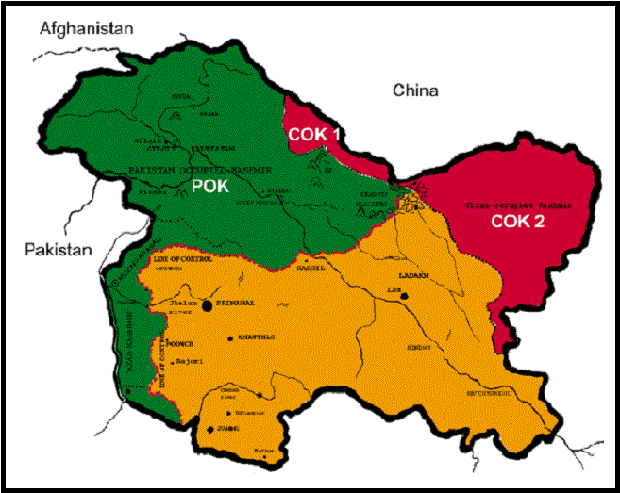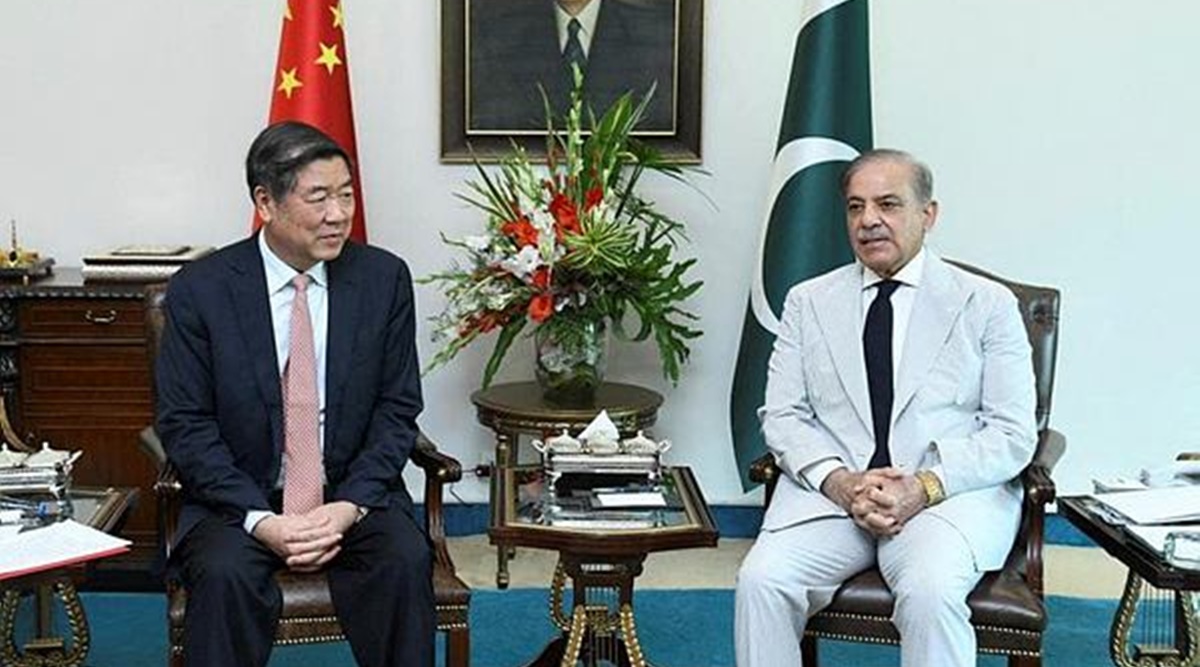Former Army Chief General VK Singh Makes A Bold Statement, POK Will Become A ‘Part Of India In Due Time’; Pakistan’s Economic Challenges Are Making POK Residents Appeal To India
Pakistan is currently grappling with a multifaceted economic crisis that is straining its resources and affecting the lives of its citizens. The nation is burdened with foreign loans, high inflation, and food shortages, all of which are contributing to a sense of desperation among the population. Responding to inquiries about the aspirations of POK's residents to join India and the BJP's stance on the matter, former Army Chief General VK Singh confidently stated, "POK will naturally become a part of India. Patience is key."

Daunting challenges mark the economic turmoil in Pakistan; with inflation soaring to over 30 per cent, putting food on the table for the poorest third of the population has become a formidable task.
Meanwhile, former Army chief General VK Singh, now a Union Minister, has expressed the belief that Pakistan-Occupied Kashmir (POK) will eventually integrate with India of its own accord. Responding to inquiries about the aspirations of POK’s residents to join India and the BJP’s stance on the matter, he confidently stated, “POK will naturally become a part of India. Patience is key.”

These comments were made during an interaction with reporters in Dausa, Rajasthan, where upcoming Assembly elections are scheduled. His remarks coincided with China’s release of a new map that included Aksai Chin in Kashmir, Arunachal Pradesh, and certain disputed areas in the South China Sea.
India’s External Affairs Minister, S Jaishankar, strongly objected to this map, noting that it was a recurring habit of China, emphasizing that altering maps to include Indian territories would not change the ground reality and reaffirmed the Indian government’s clear stance on its territorial integrity.
India has consistently maintained that POK is an integral part of the country, and it has criticized both Pakistan and China for referencing Kashmir in their joint statements.
At the SCO Summit in Goa earlier, Jaishankar criticized Pakistan for its support and financing of terrorism in Jammu and Kashmir, questioning when it would “vacate the illegally occupied territories.” Notably, he made these comments in the presence of Pakistan’s then-foreign minister, Bilawal Bhutto Zardari.
Last year, Jaishankar reiterated that POK is an integral part of India and expressed confidence that India would eventually have physical jurisdiction over the region. He emphasized that India’s position on POK was unwavering.

Anti Pakistan Protests By POK Residents
Massive anti-Pakistan protests have erupted across Pakistan-occupied Kashmir, with people protesting against rising inflation, food shortages, and excessive taxes.
Kashmiri activist Shabir Choudhry has highlighted these concerns and blamed Pakistan for the protests, stating that the people of POK are seeking help from Indian Prime Minister Narendra Modi to free them from Pakistan’s illegal occupation. Choudhry also criticized Pakistan for exploiting the region’s resources, corruption, and misguided policies.
He said, “Pakistan is perturbed over this but the most astonishing I got to hear, the people residing near the Line of Control (LoC) in PoK raised slogans, ‘Ask Modi (Indian Prime Minister Narendra Modi) to get us freedom from Pakistan’s illegal occupation!’ and save our souls, we are dying of hunger, please come here and help us out'”.
He criticized Pakistan for systematically exploiting their resources, corruption and wrong policies of the establishment, adding that people in PoK are forced to pay high electricity bills despite the region producing maximum electricity.
The cost of electricity in cash-strapped Pakistan has doubled in the last three months, resulting in widespread anger and protests.
In PoK, the people are even suffering due to heavy taxes on wheat flour and other necessities and are saturated with the miseries they have faced for the last several decades under Pakistan’s misrule.

Kashmiris say that the Pakistan government has consistently treated PoK and Gilgit Baltistan residents as second-class citizens, in stark contrast to the favoured province of Punjab.
The residents of POK have long sought international intervention to regain their freedom since Pakistan’s illegal occupation of the region in 1947, but their efforts have yet to achieve success.
Escaping Pakistan
Several factors contribute to Pakistan’s current predicament, including poor economic management, corruption, and excessive defence spending.
Food shortages caused by floods and the disruption of grain supplies due to the war in Ukraine have further compounded the crisis, and currency devaluation and high fuel subsidies have worsened inflation; meanwhile, Pakistan’s heavy reliance on imported oil has led to escalating tariffs with each oil import.
The current state of Pakistan’s economy raises crucial questions about its trajectory, and with a staggering foreign debt load and the need to repay $80 billion in the next three years, the nation is facing considerable financial strain.
In March-April this year, the Pakistani government initiated distribution sites nationwide to provide affordable and free flour to its citizens, aiming to counter its citizen’s economic hardships amid skyrocketing prices.

Unfortunately, these efforts resulted in chaotic stampedes in several locations, leading to injuries, casualties and even death, indicating how the rising costs of essential commodities are pushing people to desperate measures.
Moreover, Pakistan is grappling with an inflation rate which has exceeded 30 per cent, reaching a 50-year high, making it increasingly challenging for the poorest third of the population to put food on their tables.
China Pakistan Equation
As Pakistan grapples with this economic crisis, it also raises questions about the implications for its people and its international initiatives, particularly those involving China through the China-Pakistan Economic Corridor (CPEC), which Pakistan regards as vital for its economic future.
As of December 2022, Pakistan’s external debt and liabilities amounted to $126.3 billion, with 30 per cent owed to China.
While China has supported Pakistan’s infrastructure development through CPEC, the Pakistani government has repeatedly sought Chinese assistance for debt refinancing and rollovers; however, there are uncertainties about China’s future willingness to extend such support.
Although several CPEC projects have been agreed upon, only a few have been completed, leading to Chinese frustration over delays, project halts, and security concerns for its nationals in Pakistan. Despite these challenges, Pakistan remains a significant recipient of Chinese loans.

Critics argue that China’s high-interest loans to developing nations, including Pakistan, have worsened their economic challenges; rather than delivering the promised economic growth, CPEC loans may have contributed to Pakistan’s economic crisis.
However, it is too early to determine whether CPEC debts will ultimately burden Pakistan or open up growth opportunities.
Pakistan In Turmoil
Currently, Pakistan has the lowest GDP, per capita income, and GDP growth among its neighbouring countries, with only war-torn Afghanistan’s economy ranking lower; additionally, its unemployment and inflation rates are among the highest in the region.
Pakistan’s standing on the Human Development Index is also concerning, placing it 161st out of 185 countries in 2022, signalling its position among the countries with the lowest human development globally.
In a country where half the population is under 22 years old, investing in the education and skills of its youth could create opportunities for a more sustainable economy.
Some attribute the recent economic crisis, particularly the surge in food prices, to last year’s floods, which caused extensive damage to agricultural land, livestock, infrastructure, and roads. While this has had an impact, the war in Ukraine also disrupted grain supplies to Pakistan and other nations, further driving up food prices.

However, even before these crises, Pakistan’s economy was far from stable. According to a World Bank report, factors such as food-related shortages, transportation challenges due to floods and the Ukrainian conflict, fuel and oil subsidy hikes, and currency devaluation all played a role in exacerbating inflation.
The persistent decline in Pakistan’s currency value can be traced to its inability to repay foreign debts. Pakistan has become heavily reliant on foreign loans, a model that perpetuates borrowing and ultimately leads to financial distress. Between February 2023 and June 2026, Pakistan is faced with the daunting task of repaying around $80 billion in foreign debt.
Currently, transparency in government spending is essential, along with a fundamental shift in the country’s economic model. This shift should involve reducing overspending on defence institutions and decreasing reliance on high-interest foreign debt in favour of a more sustainable approach.
The Last Bit, Pakistan’s economic woes have been aggravated by its reliance on foreign loans and its inability to service its debt.
The country’s economic model of borrowing more only leads to a cycle of borrowing and potential bankruptcy, even as Pakistan faces the daunting task of repaying around $80 billion in foreign debt over the next few years.
The China-Pakistan Economic Corridor (CPEC) presents both opportunities and challenges; while CPEC promises economic growth, its high-interest loans have raised concerns.
Transparency in government spending and shifting away from excessive defence spending are vital steps toward a more sustainable economic model.




